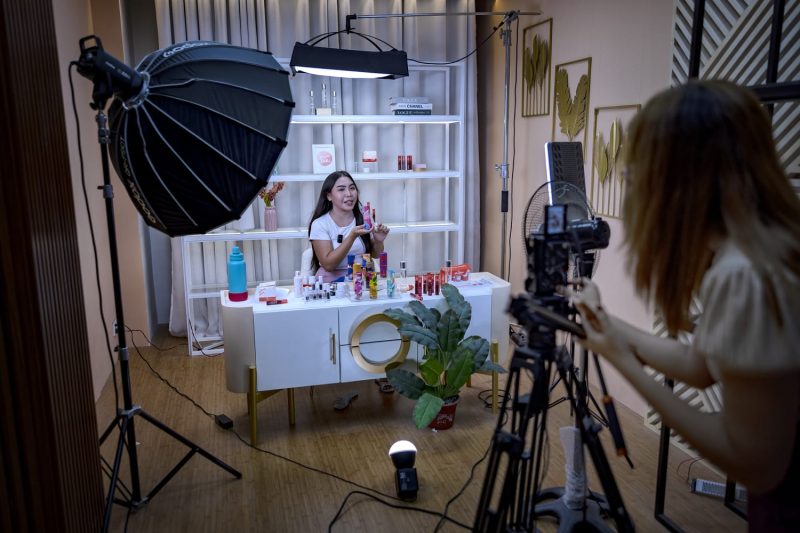GOP rep who hasn’t voted in months living in retirement facility: source
Why Amazon sellers and retailers are flocking to TikTok Shop despite looming U.S. ban

Sporting a sparkly dress and a Santa hat atop her distinctly pink hair, Sarah Potempa stood in front of her smartphone at her hair-care company’s warehouse in Waukegan, Illinois. It was time to go to work.
Potempa is a celebrity hairstylist who goes live on TikTok multiple times a week. During “the packing show,” as she calls it, Potempa livestreams herself as she packs up orders of her viral Beachwaver curling iron for six to eight hours at a time.
The stream on Nov. 20 had a party atmosphere, with Potempa taking breaks to dance to “In Da Club” by 50 Cent in between shipping out orders. To the more than 1,000 TikTok users who typically tune in for Potempa’s shows, this is entertainment and shopping all at once.
Beachwaver is part of a growing influx of retailers that are flocking to TikTok Shop, the video app’s shopping service. TikTok Shop launched in September 2023 as a way for users to purchase products without leaving the app, and since then, the China-owned app has emerged as a viable alternative for retailers looking to diversify their e-commerce business from Amazon.
Via a dedicated Shop tab, retailers big and small promote products of all kinds, ranging from eyeshadow palettes, phone chargers, detox teas, treadmills and more. On TikTok, retailers typically offer generous coupons and free delivery within a few days. Shoppable posts, which look like normal videos but are ads for products sold in TikTok Shop, frequently appear in TikTok’s main video feed, known as the “For You” page. Those posts allow users to purchase products without exiting their For You feed.
On Potempa’s show, shoppers race to place an order to get a 50% discount on Beachwaver products and free add-ons to their order like face washes or lipsticks, along with the chance to have their username read aloud by Potempa while she packs their order on screen.
“When TikTok Shop was new and people hadn’t used it yet, they would ask, ‘Is this on Amazon yet?’” Potempa said in an interview. “I would get those questions like, ‘Can I buy it somewhere else?’ Now that it’s been around for a year or so, we’ve done 1.2 million orders.”
ByteDance-owned TikTok has already cemented itself as an advertising powerhouse, and with TikTok Shop, the company has been trying to carve out another revenue stream through e-commerce. The company has attracted the likes of Nike, PacSun and Crocs, among others. Those retailers want to tap into the more than 170 million Americans on TikTok who shop on impulse as they scroll through videos.
They aren’t the only ones.
Amazon sellers are also being persuaded to try out the service with promises of low fees and steep discounts on products footed by TikTok. Besides sellers, the company has also hired talent away from Amazon, filling key roles for TikTok Shop in areas like marketing, creator relationships, brand safety, category managers and operations.
In the 15 months since its launch, TikTok Shop has emerged as a “massive e-commerce machine,” according to ecommerceDB, a market research firm. EcommerceDB predicts TikTok Shop will more than double its gross merchandise volume, or the dollar value of items sold on its marketplace, to $50 billion this year. That’s a fraction of Amazon’s 2024 expected GMV of $757 billion, but nonetheless, TikTok Shop is making strides.
“Every time you scroll, every other scroll is a Shop post, so they’re making a lot of investment to encourage that in-app conversion,” said Caila Schwartz, Salesforce’s director of consumer insights and strategy for retail and consumer goods.
Amazon spokesperson Mira Dix told CNBC in a statement that sellers are engaging with its store “more than ever before” and seeing greater success. Dix said the company’s services for sellers are optional, such as fulfillment, which costs “an average of 70% less” than comparable two-day shipping alternatives.
“Our selling partners are incredibly important to Amazon, and we work hard to innovate on their behalf and support the growth and success of these businesses across all of their sales channels,” Dix said.
Beachwaver CEO Sarah Potempa hosts livestreams on TikTok Shop multiple times a week.
TikTok’s e-commerce push comes at a precarious moment for the company.
In April, President Joe Biden signed a law that requires ByteDance to sell TikTok by Jan. 19. If TikTok fails to cut ties with its parent company, app stores and internet hosting services would be prohibited from offering the app, amounting to a nationwide ban in the U.S. TikTok has sued to block the measure.
President-elect Donald Trump could rescue TikTok from a potential U.S. ban. After trying to implement a TikTok ban during his first administration, Trump reversed his stance, acknowledging in a March interview with CNBC’s “Squawk Box” that “there’s a lot of good and there’s a lot of bad” with the app. Trump changed his position around the time that he met with billionaire Jeff Yass, who is a major investor in ByteDance.
As the January deadline grows nearer, TikTok has largely been operating its business as usual.
Executives from TikTok Shop pitched its marketplace as a holiday shopping destination during an October event in Manhattan with business owners and social media influencers. Users have shopped hundreds of millions of units on its e-commerce platform since launching September 2023, said Nico Le Bourgeois, TikTok Shop’s head of U.S. operations. Le Bourgeois, who joined TikTok in August 2023, previously spent nearly nine years at Amazon in a variety of divisions including its third-party marketplace.
TikTok Shop isn’t trying to sell “everything to everybody,” Le Bourgeois told CNBC in October. TikTok Shop is a marketplace for product discovery that surfaces “new, cool, interesting” items from big and small brands, he added.
“You see it, you like it, you buy it. It’s not a search,” he said. “It’s a very different way of shopping.”
Le Bourgeois declined to comment on the looming TikTok ban, but a company spokesperson at the event said TikTok Shop isn’t slowing down.
“The sellers here, creators, they’re building their livelihoods on TikTok,” the spokesperson said. “We’re going to continue to show up for that. There’s a huge opportunity for us.”
More Americans are expected to turn to TikTok and other China-linked apps for gift buying this holiday shopping season.
Roughly 63% of Western consumers plan to purchase from Chinese shopping apps during the season, according to Salesforce. That includes TikTok, Alibaba’s AliExpress, Shein, Temu and fast-fashion company Cider.
On Saturday, TikTok said its U.S. Black Friday sales topped more than $100 million, with home goods, fashion and beauty products among the most popular categories. Canvas Beauty, a top seller of hair-care and beauty products on TikTok Shop, hit $1 million in sales within two hours of going live on the app, the company said.
Retailers and sellers, some of which count TikTok for the lion’s share of their online sales, told CNBC that they’re sticking with the platform despite the possibility that it could disappear.
Although it’s impossible to ignore the conversation around a potential TikTok ban in the U.S. as a brand that heavily relies on the platform, Yay’s Snacks co-founder and COO Rachel Cheng said she’s not convinced that TikTok will go away under the Trump administration because it doesn’t seem to be the president-elect’s main focus.
Yay’s Snacks, which makes crispy Cambodian beef jerky, was one of the earliest companies to join TikTok Shop when it launched. Yay’s founder and CEO Marlin Chan, a former YouTuber, frequently posts humorous TikTok videos promoting his snacks, which are based on his grandmother’s original recipe. Among the videos is a series that parodies the show “Undercover Boss.” Those videos helped Yay’s amass tens of thousands of TikTok followers, who keep buying the jerky, Cheng said.
At one point, TikTok sales comprised nearly 90% of Yay’s total revenue, with monthly sales from the app peaking at $75,000 last November, Cheng said. Yay’s is prepared to divert to Amazon and its own website if TikTok is banned, but as long as TikTok is “still here, we’re going to do what we can to stay on top,” Cheng said.
“If we were sitting here worrying about what’s next, we would’ve never gotten on TikTok Shop,” Cheng said. “We’re enjoying it while it’s hot.”
Scrub Daddy, known for its smiley face-shaped sponges, went viral on TikTok during the Covid pandemic and counts more than 4 million followers. Its top video, a demonstration of its Damp Duster sponge, has 30 million views while its bestselling product on TikTok Shop has been purchased nearly 76,000 times, according to the app. That figure doesn’t account for items that have been returned after purchase.
After kicking off in 2012 with an appearance on “Shark Tank,” Scrub Daddy CEO Aaron Krause said he lost faith in traditional marketing efforts.
“We did a TV ad, we did some outdoor ads on billboards, we did a little bit of radio,” Krause said. “All I found was that I was throwing money into the air.”
The company pivoted toward social media marketing, primarily on Instagram, which turned out to be a “pot of gold,” Krause said. Scrub Daddy set up an account on TikTok in 2020 and worked with influencers to promote its products, including Vanesa Amaro, a popular account for housecleaning content with more than 5.7 million followers. After Amaro recommended the sponges to her viewers, Scrub Daddy sold 30,000 units in one weekend, Krause said.
TikTok’s “algorithm just allows you to hit millions and millions of views with one hysterically crazy video,” he said.
In recent months, TikTok has encouraged retailers and sellers to host hourslong livestreams multiple times per week as a way to connect with shoppers. Many brands have invested in building out their own studios to record the shows or have hired talent to host them.
Scrub Daddy snatched up longtime QVC host Dan Hughes after he was laid off from the home shopping company in 2023. Others, like Beachwaver, have turned their CEOs into on-screen talent.
TikTok Shop was a big topic of conversation at a conference for Amazon sellers in New York in October. A session on “how to scale your brand” with TikTok Shop drew a packed room of sellers who listened to e-commerce strategist Rafay MH talk up the potential for brands to haul in $8 million to $10 million in sales from TikTok in less than a year.
“Amazon comes with a ton of competition,” MH said. “TikTok is the opportunity for free eyeballs and sales.”
Many Amazon sellers have embraced TikTok after they were initially slow to join the platform, said Michelle Barnum Smith, who provides consulting services to online businesses.
“I was the bedraggled gold miner standing on the street corners of New York, saying ‘There’s gold in those hills,’ and people were like, ‘Yeah, sure,’” Barnum Smith said “But as soon as they started seeing their competition on there, or their buddy on there, they were like, ‘I’ve got to get on there.’”
There’s now “extreme FOMO,” or fear of missing out, among Amazon sellers to join TikTok even if it no longer exists in the U.S. next year, Barnum Smith said.
“Whatever the future looks like for TikTok Shop, they’re happy to take that money now and get while the getting’s good,” Barnum Smith said.
Disclosure: CNBC owns the exclusive off-network cable rights to “Shark Tank.









